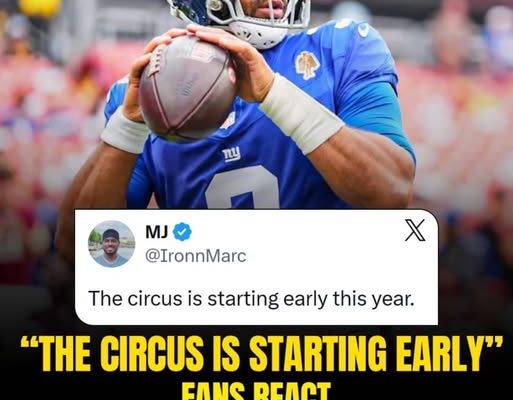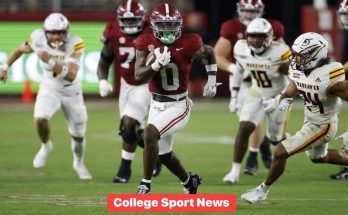NFL fans across the country have been left scratching their heads following the recent comments from New York Giants head coach Brian Daboll regarding quarterback Russell Wilson and his status as the Week 2 starter. Coming off a season opener that left much to be desired, the discussion about Wilson’s role in the offense has become an increasingly heated topic among fans, analysts, and even players. What makes Daboll’s stance particularly surprising is not just the content of his statements, but the broader context in which they were delivered, shedding light on his coaching philosophy, team dynamics, and the complex pressures surrounding elite quarterbacks in the NFL today.
When the Giants faced off against their Week 1 opponent, the game offered a mix of flashes of potential and glaring inefficiencies. Wilson, a Super Bowl-winning quarterback with the Seattle Seahawks, is expected to bring veteran leadership and high-level performance to a franchise eager to compete at the top tier of the league. However, in the opening week, there were signs that the transition has not been seamless. Fans observed miscommunications with receivers, delayed decision-making, and moments of uncharacteristic hesitancy in the pocket. This fueled debates online and in sports media about whether Wilson should maintain his starting role moving forward or if the team should begin exploring other options.
What caught many off guard was Daboll’s measured, almost nonchalant approach in publicly addressing Wilson’s status. In interviews and press conferences following Week 1, the coach avoided providing definitive answers while still making it clear that Wilson remains the starter for the immediate future. Daboll emphasized consistency, chemistry, and the importance of giving Wilson time to adjust, even while acknowledging the team’s struggles. For a coach in a league where results are demanded immediately and starters are often benched after just one poor performance, Daboll’s patience struck many as unusual and even risky. NFL fans are accustomed to quick decisions that signal urgency and accountability, and Daboll’s comments appeared to buck that trend.
One aspect that fans found particularly intriguing is Daboll’s emphasis on context. He pointed out that while the first game did not go according to plan, it is not necessarily indicative of Wilson’s overall ability or the trajectory of the season. This perspective is grounded in the understanding that team success hinges on more than a single quarterback’s performance; offensive line protection, play-calling, receiver execution, and defensive schemes all contribute to outcomes. By framing the Week 1 struggles as a team-wide challenge rather than solely Wilson’s responsibility, Daboll subtly shifted the narrative and reminded fans that patience may be warranted, even in a results-driven sport like football.
However, this approach has generated a mixed reaction. On one hand, veteran players and some analysts have praised Daboll for his leadership and measured communication style, arguing that quarterbacks, particularly those transitioning to a new system, require time to settle in. Russell Wilson, despite his experience, is adjusting to a different offensive scheme, new teammates, and the expectations of a passionate fanbase that has not seen consistent success in recent seasons. Allowing him room to recalibrate could be the difference between a short-term stumble and long-term stability. On the other hand, critics argue that in the NFL, patience is often a luxury that teams cannot afford. The league’s competitive parity means that a slow start can snowball into a season-long struggle, and fans fear that Daboll’s cautious approach may risk early losses that could have been avoided with a more decisive stance.
Adding another layer to the controversy is the historical context of quarterback management in the NFL. The pressure to perform is immense, and the treatment of quarterbacks often reflects broader team philosophies. Some franchises are known for giving their starters extended leeway to develop chemistry and master a system, while others are notoriously impatient, quick to bench even high-profile signal-callers after poor performances. Daboll’s comments place the Giants more in the former category, prioritizing strategic continuity over immediate reactionary changes. This approach signals confidence in Wilson’s ability to rebound and leadership qualities while simultaneously highlighting Daboll’s desire to avoid impulsive decisions that could disrupt team cohesion.
Fans’ reactions on social media have ranged from cautious optimism to outright frustration. Many are hopeful that Wilson will settle into the offense, citing his track record of success and leadership as reasons to trust Daboll’s judgment. Supporters argue that rushing to bench Wilson after a single rough outing could undermine his confidence and the team’s overall morale. Conversely, skeptics point to the urgency of the NFL season and the Giants’ need to secure wins early to remain competitive. For these fans, Daboll’s reluctance to make a firm statement about Wilson’s role is a source of concern, particularly given the high stakes associated with each game in a 17-game regular season.
Another factor contributing to fan shock is the sheer expectation surrounding Wilson’s arrival. When the Giants acquired him, there was widespread anticipation that he would be the franchise-altering quarterback capable of elevating the team’s performance immediately. Week 1, however, reminded everyone that transitions, even for elite players, are rarely seamless. Daboll’s decision to publicly support Wilson without offering guarantees about performance thresholds reflects a nuanced understanding of both the player and the team, but it runs counter to the public narrative of instant impact that often accompanies marquee acquisitions. This disconnect between fan expectations and coaching strategy has fueled much of the discourse surrounding his comments.
It is also important to consider the psychological dimension of Daboll’s statements. By maintaining ambiguity about Wilson’s status, the coach may be employing a strategic communication tactic aimed at alleviating pressure while motivating both the quarterback and the team. In a league where media scrutiny can be relentless, and public opinion can shift quickly, keeping opponents, fans, and even internal personnel slightly off balance can be a way to manage expectations and control the narrative. Daboll’s stance demonstrates not just a focus on immediate performance but a broader management of team dynamics, morale, and mental preparedness—all crucial components for sustained success over a long season.
The broader implications of Daboll’s approach extend beyond just Week 2. How he manages Wilson could set a tone for the team’s culture and quarterback development philosophy. A measured, patient approach could foster loyalty and cohesion, sending a message to both players and staff that performance is evaluated in context and that the organization values stability. Conversely, if early struggles continue, critics may argue that Daboll’s hesitation could have allowed issues to fester, raising questions about his decisiveness and ability to adapt under pressure. This balancing act between patience and accountability is a hallmark of leadership challenges in professional sports, and Daboll’s handling of the situation will likely be scrutinized throughout the season.
For Russell Wilson, the pressure is undeniably intense. While Daboll’s comments provide a degree of reassurance, they also come with an implicit challenge: adjust quickly and perform consistently to justify the trust placed in him. Wilson has built a reputation as a resilient and intelligent quarterback capable of adapting to difficult situations. However, the Giants’ Week 1 performance served as a reminder that no player, regardless of past accolades, operates in isolation. Success will depend on a collective effort, coordination with coaching staff, and the ability to execute under pressure against top-tier competition. Daboll’s stance reflects an understanding of this reality, emphasizing process over panic, preparation over reaction.
As Week 2 approaches, the spotlight on Wilson and Daboll intensifies. Analysts will be watching film closely, fans will be scrutinizing every throw, and media narratives will continue to shape public perception. Daboll’s comments have, intentionally or not, framed the conversation in a way that keeps attention on the broader team context rather than solely on Wilson’s performance. Whether this approach proves effective remains to be seen, but it certainly underscores the complexities of quarterback management in the NFL. Balancing expectations, talent, and team cohesion is no small feat, and the conversation around Week 2 will likely reflect the ongoing tension between short-term performance and long-term vision.
Ultimately, Daboll’s stance on Russell Wilson as the Week 2 starter offers a compelling case study in leadership, patience, and strategic thinking in professional football. By publicly affirming Wilson’s role while avoiding definitive guarantees, he has sparked discussion, debate, and in some cases, outright shock among NFL fans. The situation highlights the pressures faced by coaches and players alike in a results-driven environment, the challenge of meeting fan expectations, and the importance of managing both talent and team dynamics carefully. As the Giants prepare for their next game, the world will be watching closely to see whether Wilson can rise to the occasion, justify the trust placed in him, and help his team achieve the kind of success that has long eluded the franchise. Daboll’s comments have not only fueled discussion but also set the stage for a narrative that could define the early weeks of the season, offering insight into how patience, strategy, and leadership intersect in the high-stakes world of the NFL.
Fans will undoubtedly continue to debate, speculate, and analyze every move, but one thing is clear: Daboll’s approach to Russell Wilson is unconventional, thought-provoking, and emblematic of the nuanced challenges that define modern professional football. Whether it will yield the desired results remains to be seen, but it has already left a lasting impression on the conversation surrounding one of the league’s most closely watched quarterbacks.
The scrutiny, excitement, and tension surrounding this storyline reflect the enduring passion of NFL fans and the high stakes of a sport where a single game can shift the trajectory of a season. Daboll’s measured stance challenges conventional wisdom, reminding fans that leadership is not just about immediate outcomes but about managing people, expectations, and the intricate dynamics of a team. In the coming weeks, as the Giants take the field, all eyes will be on Wilson and the team’s ability to translate this nuanced strategy into tangible results. In the ever-evolving drama of the NFL, this saga is just beginning, and the conversation around Daboll and Wilson is likely to remain a central talking point for fans, analysts, and commentators alike.
This unfolding situation underscores the intersection of strategy, psychology, and performance in professional football. Daboll’s decision to stand by Wilson, while unusual in its restraint, may ultimately prove to be a masterstroke—or a cautionary tale—about leadership, trust, and the challenges of navigating the expectations placed on elite athletes in one of the world’s most competitive sports. The coming weeks will reveal whether patience, experience, and strategic support can overcome early-season adversity, or whether the pressures of expectation and performance will demand a different approach. Regardless, Brian Daboll’s stance has already made an indelible mark on the NFL discourse, demonstrating that leadership in football is as much about timing, judgment, and insight as it is about X’s and O’s.
Fans across the league will continue to watch with anticipation, eager to see how this dynamic unfolds and whether the Giants can leverage both talent and strategy into meaningful success. Brian Daboll’s stance, unconventional as it may seem, offers a window into the complexities of modern NFL coaching, where every decision is scrutinized, every statement analyzed, and every game holds the potential to redefine narratives. For now, the spotlight remains firmly on Russell Wilson and the Giants, with the story of Week 2 poised to shape the trajectory of both player and team in ways that will be remembered long after the season concludes.



